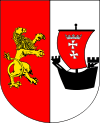Pruszcz Gdański
Pruszcz Gdański (pronounced [pruʂtʂ ˈɡdaj̃skʲi]; former Polish: Pruszcz; German: Praust)[1] is a town in Pomerania, northwestern Poland with 26834 inhabitants (2010). Pruszcz Gdański is an industrial town neighbouring Gdańsk, part of the Tricity agglomeration. The Tricity Circle Highway begins in Pruszcz Gdański.
Pruszcz Gdański | |
|---|---|
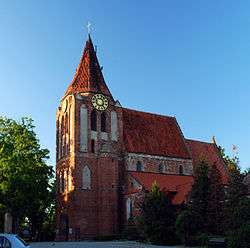 Exaltation of the Holy Cross Church | |
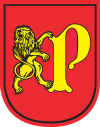 Coat of arms | |
 Pruszcz Gdański | |
| Coordinates: 54°16′N 18°38′E | |
| Country | |
| Voivodeship | |
| County | Gdańsk |
| Gmina | Pruszcz Gdański (urban gmina) |
| Established | 14th century |
| Town rights | 1941 |
| Government | |
| • Mayor | Janusz Wróbel |
| Area | |
| • Total | 16.47 km2 (6.36 sq mi) |
| Population (2010) | |
| • Total | 26,834 |
| • Density | 1,600/km2 (4,200/sq mi) |
| Time zone | UTC+1 (CET) |
| • Summer (DST) | UTC+2 (CEST) |
| Postal code | 83-000 |
| Area code(s) | +48 58 |
| Car plates | GDA |
| Website | www |
The capital of Gdańsk County in Pomeranian Voivodeship since 1999, Pruszcz Gdański was a town in the Gdańsk Voivodeship from 1975 to 1998. Polish State Railways has a railway station in the town.
History
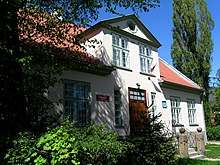
The town was first mentioned as 'Prust'. The Polish government of the region employed the name Pruszcz until the town became part of Prussia as the result of the Partitions of Poland. For a couple of centuries Pruszcz was often visited by Polish kings, during their travels to nearby Gdańsk.
Between 1871 and 1920 Pruszcz as Praust was part of Germany. Unlike most of Eastern Pomerania, the town did not return to Poland after regaining independence, but was included in the short-lived Free City of Danzig by the Treaty of Versailles. During World War II, Pruszcz was the location of Nazi Germany's Praust concentration camp, a female subcamp of the Stutthof concentration camp. After the region was finally reintegrated with Poland in 1945, the local German population was expelled. As early as 30 March 1945, the Polish Post Office began its work as the first post-war Polish institution in the town. In post-war Poland the adjective Gdański was added to the town's name, after the nearby city of Gdańsk, to distinguish the town from other Polish settlements of the same name.
Education
Schools:
- Zespół Szkół Ogólnokształcących nr 1
- Liceum Ogólnokształcące
- Gimnazjum nr 1
- Szkoła Podstawowa nr 2 w Pruszczu Gdańskim - School website
- Szkoła Podstawowa nr 3
- Zespół Szkół nr 4
- Katolickie Szkoły Niepubliczne im. Jana Pawła II - School website
- Prywatna Szkoła Muzyczna I stopnia
Preschools:
- Przedszkole Publiczne nr 3
- Niepubliczne Przedszkole im. Janusza Korczaka
- Niepubliczne Przedszkole „Promyczek”
- Oddziały Przedszkolne Szkoły Podstawowej nr 2 „Dwójeczka”
- Niepubliczne Przedszkole „Jedyneczka”
- Niepubliczne przedszkole „Czwóreczka”
Population
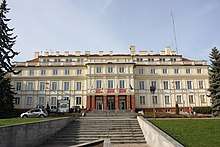
|
|
|
Sports
The clubs local football club is Czarni Pruszcz Gdański.
Notable people
- Edward Jurkiewicz (born 1948 in Pruszcz Gdański) a Polish former professional basketball player, competed in the 1968 Summer Olympics
- Mateusz Bąk (born 1983 in Pruszcz Gdański) a Polish footballer who currently played for Lechia Gdańsk as a goalkeeper.
See also
References
- "Former Territory of Germany" (in German). 2017-11-28.
External links
- Municipal website (in Polish)
- photos from Pruszcz Gdański
